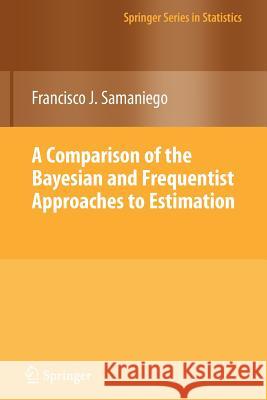A Comparison of the Bayesian and Frequentist Approaches to Estimation » książka
A Comparison of the Bayesian and Frequentist Approaches to Estimation
ISBN-13: 9781461426196 / Angielski / Miękka / 2012 / 225 str.
A Comparison of the Bayesian and Frequentist Approaches to Estimation
ISBN-13: 9781461426196 / Angielski / Miękka / 2012 / 225 str.
(netto: 382,46 VAT: 5%)
Najniższa cena z 30 dni: 385,52
ok. 22 dni roboczych
Dostawa w 2026 r.
Darmowa dostawa!
The main theme of this monograph is comparative statistical inference. While the topics covered have been carefully selected (they are, for example, restricted to pr- lems of statistical estimation), my aim is to provide ideas and examples which will assist a statistician, or a statistical practitioner, in comparing the performance one can expect from using either Bayesian or classical (aka, frequentist) solutions in - timation problems. Before investing the hours it will take to read this monograph, one might well want to know what sets it apart from other treatises on comparative inference. The two books that are closest to the present work are the well-known tomes by Barnett (1999) and Cox (2006). These books do indeed consider the c- ceptual and methodological differences between Bayesian and frequentist methods. What is largely absent from them, however, are answers to the question: which - proach should one use in a given problem? It is this latter issue that this monograph is intended to investigate. There are many books on Bayesian inference, including, for example, the widely used texts by Carlin and Louis (2008) and Gelman, Carlin, Stern and Rubin (2004). These books differ from the present work in that they begin with the premise that a Bayesian treatment is called for and then provide guidance on how a Bayesian an- ysis should be executed. Similarly, there are many books written from a classical perspective."
This monograph contributes to the area of comparative statistical inference. Attention is restricted to the important subfield of statistical estimation. The book is intended for an audience having a solid grounding in probability and statistics at the level of the year-long undergraduate course taken by statistics and mathematics majors. The necessary background on Decision Theory and the frequentist and Bayesian approaches to estimation is presented and carefully discussed in Chapters 1 3. The threshold problem -- identifying the boundary between Bayes estimators which tend to outperform standard frequentist estimators and Bayes estimators which don t -- is formulated in an analytically tractable way in Chapter 4. The formulation includes a specific (decision-theory based) criterion for comparing estimators. The centerpiece of the monograph is Chapter 5 in which, under quite general conditions, an explicit solution to the threshold is obtained for the problem of estimating a scalar parameter under squared error loss. The six chapters that follow address a variety of other contexts in which the threshold problem can be productively treated. Included are treatments of the Bayesian consensus problem, the threshold problem for estimation problems involving of multi-dimensional parameters and/or asymmetric loss, the estimation of nonidentifiable parameters, empirical Bayes methods for combining data from similar experiments and linear Bayes methods for combining data from related experiments. The final chapter provides an overview of the monograph s highlights and a discussion of areas and problems in need of further research.§F. J. Samaniego is a Distinguished Professor of Statistics at the University of California, Davis. He served as Theory and Methods Editor of the Journal of the American Statistical Association (2003-05), was the 2004 recipient of the Davis Prize for Undergraduate Teaching and Scholarly Achievement, and is an elected Fellow of the ASA, the IMS and the RSS and an elected Member of the ISI.











